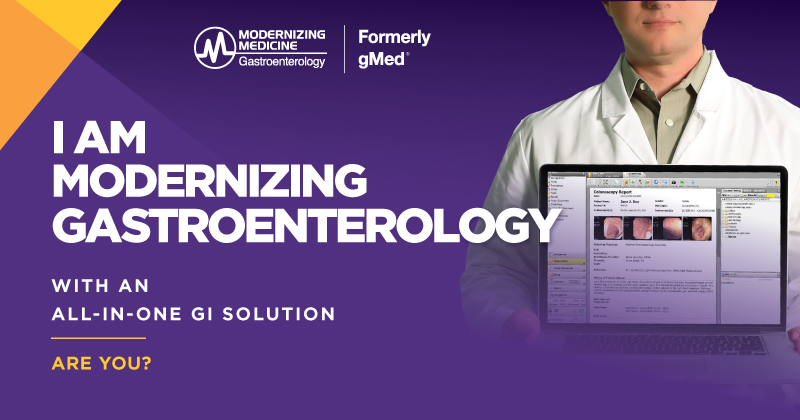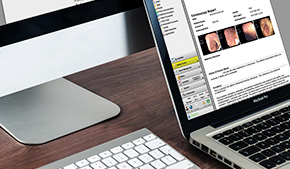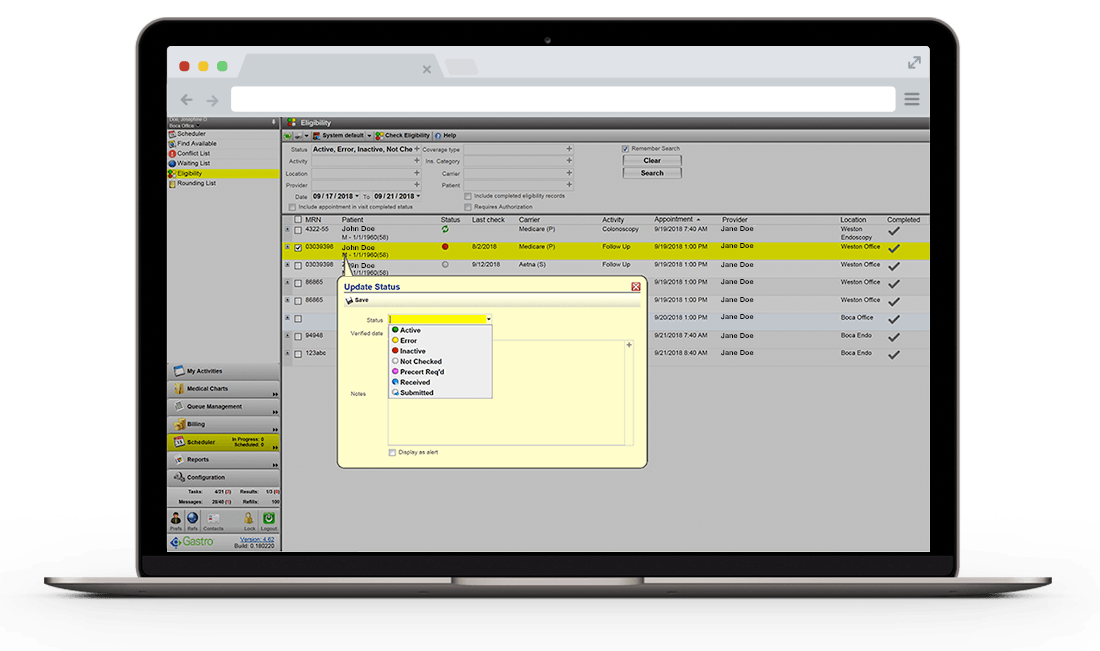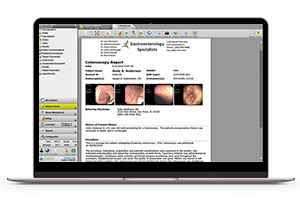Gastroenterology EHR- The Good, the Bad and the Need-To-Have

A closer look at common problems with gastroenterology EHRs and some of the best features being offered today.
Living with symptomatic electronic health records (EHR) software is no fun. Especially when you’re a busy gastroenterologist. When tasked with performing multiple procedures in one day, having an EHR that is filled with server hang-ups and software bugs can not only slow you down, it can burn you out in your practice.
According to the U.S. National Library of Medicine (NIH), the most common procedures performed by GI physicians are colonoscopies and endoscopies. Imagine trying to perform dozens of colonoscopies and endoscopies using an outdated EHR. When you’re not using a specialty-specific, GI EHR with a robust endoscopy report writer, many of your specific workflows may not be properly addressed.
What is a solution? Consider having an endoscopy report writer integrated with your gastroenterology EHR. This can really help satisfy specific workflows needed for these types of procedures. It can ease the document writing process, helping save time and improve the overall patient experience. When considering switching to a gastroenterology EHR with an integrated ERW, the following negative features seem to lend themselves to the most complaints:
- Server slow to respond, causing long delays between screens
- Re-documentation of information long after the patient has left the exam room
- GI content that is not preloaded continuing to cause inconvenient slow-downs
- MIPS metrics are not integrated with the software, slowing not only you down but the practice administrator
Referring to these unfortunate EHR hang-ups as symptoms helps classify the severity of the situation. When a busy gastroenterologist sees dozens and dozens of patients a day, splits their time between their main office and their ASC, and is on an outdated EHR system that is not even specialty-specific, that can wind up not being good.
To Get from Paper to the Screen, You’ll Need an All-In-One Gastroenterology EHR
 More and more gastroenterologists are seeing the need to upgrade or even switch their EHRs. A major catalyst for this need to switch can be when EHR vendors are not specialty-specific, or they only offer EHR software without practice management integration, or analytics integration. This slows down the documentation process and causes longer-than-necessary workdays – not only for the gastroenterologists – but also for the extenders and front office staff.
More and more gastroenterologists are seeing the need to upgrade or even switch their EHRs. A major catalyst for this need to switch can be when EHR vendors are not specialty-specific, or they only offer EHR software without practice management integration, or analytics integration. This slows down the documentation process and causes longer-than-necessary workdays – not only for the gastroenterologists – but also for the extenders and front office staff.
An EHR without a suitable practice management system can also wreak havoc when juggling tons of patients between office visits and ambulatory surgery center appointments. With practice management software integrated into a gastroenterology EHR, it can be easier to search up appointments, schedule out treatment plans, and coordinate physicians in the practice. This not only helps save tremendous amounts of time, it can improve show-rates and help the practice’s overall bottom line.
Another product that has shown to be immensely helpful with the unique needs of gastroenterology doctors is the use of a suitable endoscopy report writer (ERW). An ERW helps reduce documentation when performing specific procedures, saving valuable amounts of time and improving the overall patient experience. Using an ERW integrated with a robust specialty-specific platform is a great way to keep your office and ASC connected, making patient schedules and treatment plans streamlined and trackable. This is just another aspect of your gastroenterology EHR that you may want to incorporate to help your practice be more successful.
So, what should you look for when committing to a digital platform dynamic enough to not only handle your practice, but assist you in making it better? Three key things:
1. Specialty-specific – having a gastroenterology EHR means it adapts to your unique workflows and comes loaded with specific content pertaining to your specialty.
2. Cloud-based or server-based – choose the option that works for you. A cloud-based EHR means if you can connect to the internet, you have comprehensive access to your data and EHR. A server-based EHR lets you manage network, security, storage and infrastructure decisions.
3. All-in-one solution – choosing an EHR that supports integration with billing, analytics and an endowriter is really important when going digital. Bringing the office, hospital and endocenter together in one, easy-to-use software integration platform can not only streamline your practice, it can help impact doctor-patient care in a positive way.
Along with these three important features, it’s also valuable to find an EHR vendor that champions excellent customer service. Even with an easy set-up EHR, you’ll most likely still have questions as you adapt your practice to your new, state-of-the-art system. Having a team of professionals guide you through the process is one less thing to worry about.
Modernizing Practice Management Software With Better Information
 Practice management software enables busy gastroenterologists to keep all of their business, financial and operational data in one, easy-to-access place. With the right gastroenterology EHR vendor, a practice management software solution will be seamlessly integrated and powerfully useful to practice administrators and office staff.
Practice management software enables busy gastroenterologists to keep all of their business, financial and operational data in one, easy-to-access place. With the right gastroenterology EHR vendor, a practice management software solution will be seamlessly integrated and powerfully useful to practice administrators and office staff.
Combining the power of analytics, whether on a cloud-based or server-based platform, means GI doctors have the ability to track their performance and see how they scale up against other GI doctors in their field.
Premium features of analytics platforms such as performance tracking can give you the power to introduce the technology, tools, support and knowledge needed to give you an in-depth and comprehensive analysis of your performance. This ultimately can lead to busy GI doctors making better decisions for their entire office.
Gastroenterology Billing Within an Integrated Practice Management System
Within the realm of practice management software, more and more gastroenterologists see the need for powerful financial analysis tools and business operations tools. Some key things to look for when choosing a vendor to help with billing, operations and office functions include:
- Seamless, all-in-one system
- Automated eligibility checks & claim scrubs
- Comprehensive financial reports
- Specialists that manage your billing & collections
Since gastroenterology billing and office issues can present time-consuming complications, choosing a platform with seamless integration, dedicated billing specialists and specialty-specific technology can not only help reduce time, it also can assist doctors overall in their practice.
The Endoscopy Report Writer
 Endoscopy report documentation can slow gastroenterologists down and cause disorganized workflow problems. When you find a competent endoscopy report writer, the possibility of combining your ASC, office and hospital with a suite of software solutions can become a reality. Accessing both clinical and endoscopy records within the same system can provide critical information, when you need it the most. Office teams can utilize and update data without duplicate entries.
Endoscopy report documentation can slow gastroenterologists down and cause disorganized workflow problems. When you find a competent endoscopy report writer, the possibility of combining your ASC, office and hospital with a suite of software solutions can become a reality. Accessing both clinical and endoscopy records within the same system can provide critical information, when you need it the most. Office teams can utilize and update data without duplicate entries.
Some other need-to-have features may include:
- Customizable workflow and templates
- Document procedures instantly by creating Quick Notes
- Full-text record searching to quickly identify potential research patients
- Interoperability with hospital information systems and more
- Integrated Nursing Notes to populate key information into procedure notes
- Interfaces with vital signs monitors and endoscopy scopes
- Robust data analytics and benchmarking capabilities
- Built-in gastroenterology content, including:
- Findings
- Interventions
- Therapeutics
- Best practices
Finding the right suite of solutions can bring your office, ASC and hospital together in ways you didn’t even know were possible.
Step Into The Future and See How Modern Your Gastroenterology Practice Can Be
Improving efficiency and helping your patients have an even better healthcare experience are the first steps to modernizing your practice.
Using outdated technology can slow down your practice and negatively impact the overall doctor-patient experience. Plus, with all of the new advancements and software services being offered, it’s easy to see why so many successful gastroenterologists are upgrading to a leading EHR vendor. While change may be difficult, being left behind in the dark ages when it comes to your gastroenterology EHR is not conducive to a successful and healthy practice.
Modernizing Medicine’s leading EHR, gGastro®, has been voted by Black Book™ as the #1 GI EHR for nine years straight. Along with offering a complete suite of solutions, Modernizing Medicine® Gastroenterology’s specialty-specific gGastro suite exemplifies award-winning customer service.
Imagine buying the latest computer with virtually no computer experience. You’re going to have tons of questions and may even feel like you’re learning a foreign language. In the past, this situation may have presented itself for many doctors. However, that was before vendors began to see the importance of having solid training and implementation teams. Having a team of professionals to help guide you every step of the way can make the process of set-up so much easier and enjoyable. And along with meeting your practice’s unique needs, most vendors have teams in place that will work with you every step of the way to put customized plans together for you and your practice.
Ultimately, the choice is yours. Having an EHR that learns from you, adapts to your specific workflow preferences and connects you to practicing gastroenterologists within the field can help you save time and improve your practice’s financial health.
Get the information you need, exactly when you need it. Learn why more and more gastroenterologists are choosing the gGastro suite, built by practicing doctors in the field.
Seamless, comprehensive technology will not only help improve your overall practice, it will become an assistant to your specific needs as a gastroenterologist.




